On a recent Friday, an important labor dispute unfolded in the Pacific Northwest as approximately 33,000 blue-collar workers at Boeing initiated a strike after rejecting a proposed four-year contract. This strike represents a significant shift for the conglomerate, which has been grappling with numerous operational and financial challenges, including a dramatic decline in stock prices—down nearly 40% for the year. The rejected contract offered a 25% wage increase, yet many workers deemed it insufficient considering the escalating living costs in their region. This situation paints a broader picture of the complex dynamics at play between Boeing, its workforce, and the economic landscape surrounding them.
The machinists, represented by the International Association of Machinists and Aerospace Workers, voiced their frustrations loud and clear. A staggering 94.6% of union members who participated in the vote opposed the contract proposed by the union’s own bargaining committee, and a remarkable 96% voted in favor of striking. Their discontent is rooted in a broader sense of economic insecurity that reflects the realities faced by many working-class families. Observations from the picket line revealed stark messages conveyed through placards, with slogans highlighting the financial pressures many of them feel, such as rising housing prices.
Workers like John Olson, who has been with Boeing for six years, articulated a widespread belief that the proposed wage increase failed to truly account for inflation and the rising costs of living. His pay has only seen a 2% hike, which starkly contrasts with the massive profits and corporate recoveries that large companies often tout. This disconnect fosters frustration and distrust toward corporate leadership, further fueling the narrative of inequality.
The Terms of the Proposed Contract: An Overview
Although the rejected contract would have resulted in an increase in average annual pay from about $75,608 to over $106,000, many workers considered these terms inadequate—especially when weighed against their demands for a 40% wage increase over three years. The proposed contract also featured lump-sum payments and modifications to health care contributions, but these incentives did little to sway workers who have felt the impacts of stagnant wages and eliminated pensions over the last decade.
Despite promising to maintain production in Washington state for the next new aircraft model, the company’s offer did not adequately address the historical grievances and economic challenges faced by the workers. Union leaders, like IAM District 751 President Jon Holden, indicated that, moving forward, they would be reassessing priorities based on the desires of the membership. This demonstrates a shift in focus; workers are asserting their voice and actively seeking to reclaim their power in the corporate structure.
Implications for Boeing and Its Leadership
Amid the backdrop of a deteriorating financial situation, Boeing’s leadership faces a daunting challenge. Newly appointed CEO Kelly Ortberg, who has been meeting with factory workers in an attempt to gather insight, must navigate the turbulent waters of labor relations while addressing the significant debts and reputational damage that Boeing has accumulated. The rejection by rank-and-file workers of a deal reached with union leaders indicates a fundamental breakdown in trust, which is difficult to rebuild, especially during a time when public sentiment towards corporations is fraught with skepticism.
Boeing reacted to the strike announcement by reiterating its readiness to negotiate, but it must also acknowledge that the company’s difficulties are deeply intertwined with a larger discussion about workplace respect and equity. In the context of the strike, this isn’t just a negotiation about wages; it’s a critical discussion about the dignity and acknowledgment of hard work.
The ramifications of the strike could have significant financial consequences for Boeing. Historically, interruptions in production have led to immense revenue losses, with estimates indicating that the last strike in 2008 resulted in losses of about $100 million per day. Analysts have projected similar impacts from this current strike, especially given the urgency for companies to deliver on airline production schedules in the competitive aviation market.
As the strike intensifies, the question of economic sustainability looms larger. Workers like Solomon Hammond are prepared to remain on the picket line indefinitely, fiercely advocating for better wages that align with the cost of living. This illustrates a pivotal moment in labor relations at Boeing, with workers collectively asserting that they will not settle for less in an economy that demands more.
The recent strike by Boeing workers sheds light on systemic issues within large corporations that often leave the needs of the workforce unheard. While the company strives to negotiate a resolution, the outcry from its machinists emphasizes a critical demand for respect, equity, and fair compensation. As Boeing attempts to navigate its way through financial turmoil, it must recognize that addressing the needs of its dedicated workers is not just a matter of corporate responsibility; it is essential for long-term viability in an industry characterized by intense competition and rapid change. The coming weeks will be crucial as both sides seek to find common ground amidst mounting pressures from the economy and their shared future.


Leave a Reply